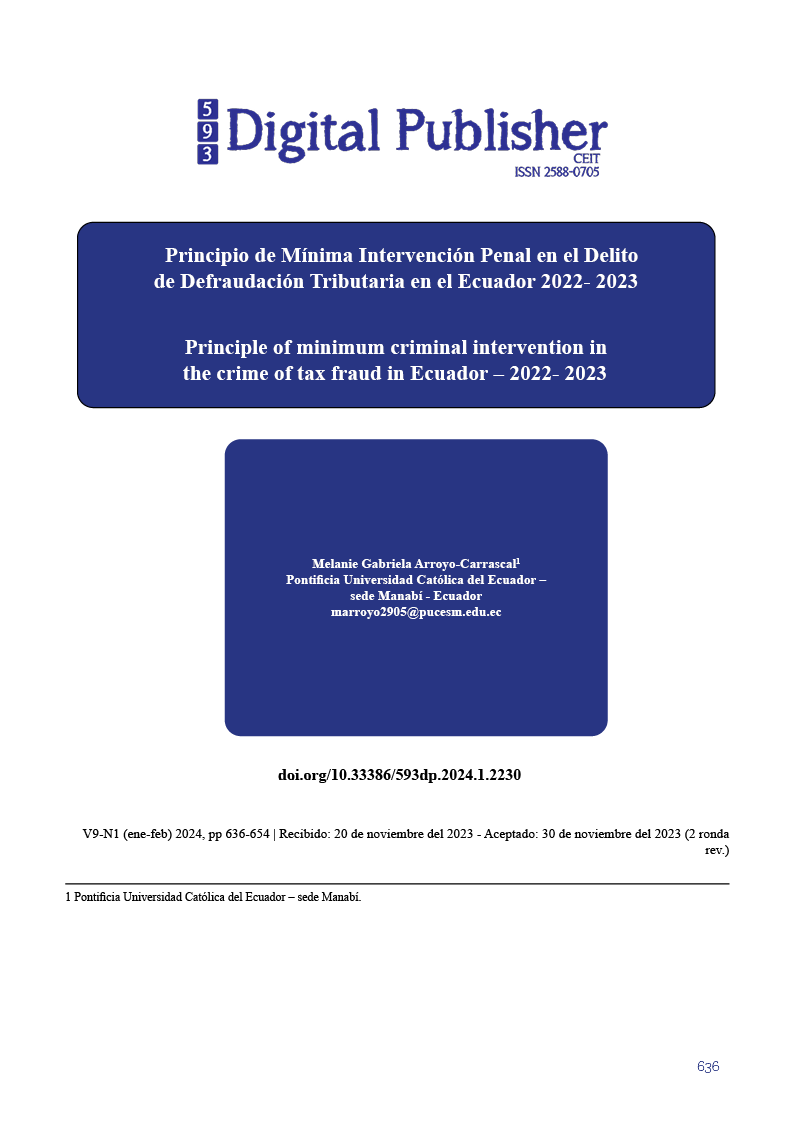Principle of minimum criminal intervention in the crime of tax fraud in Ecuador – 2022- 2023
Main Article Content
Abstract
It is the duty of citizens to pay taxes, to result in the proper functioning of the country, since with the payment of these public services, security, health, education, among other contributions, are maintained for the progress of the country and thus be able to improve the quality of life. Tax Fraud is of mixed category, as it is a crime of injury, but it can also represent one of danger. In Ecuador, it corresponds to the intention of the taxpayer to deceive the State in the amounts to be taxed, in order to seek his own benefit or that of a third party and thus affecting the power to collect. However, due to the principle of minimum criminal intervention, it is the obligation of the collecting entity to seek alternative methods, before initiating criminal proceedings against the taxpayer, seeking that the penalty is proportional to the seriousness of the conduct. In this research, a comparative approach will be used to analyze the treatment of tax fraud by the tax administrations of different countries, in this case, Ecuador and Colombia. This approach makes it possible to examine the strategies and methods used before resorting to criminal proceedings. Through this comparative research, it is possible to gain valuable insights into best practices, potential challenges, and opportunities for improvement in fraud management.
Downloads
Article Details

This work is licensed under a Creative Commons Attribution-NonCommercial-ShareAlike 4.0 International License.
1. Derechos de autor
Las obras que se publican en 593 Digital Publisher CEIT están sujetas a los siguientes términos:
1.1. 593 Digital Publisher CEIT, conserva los derechos patrimoniales (copyright) de las obras publicadas, favorece y permite la reutilización de las mismas bajo la licencia Licencia Creative Commons 4.0 de Reconocimiento-NoComercial-CompartirIgual 4.0, por lo cual se pueden copiar, usar, difundir, transmitir y exponer públicamente, siempre que:
1.1.a. Se cite la autoría y fuente original de su publicación (revista, editorial, URL).
1.1.b. No se usen para fines comerciales u onerosos.
1.1.c. Se mencione la existencia y especificaciones de esta licencia de uso.
References
Blacio Aguirre, R. (2012). El Tributo En El Ecuador. Revista De La Facultad De Derecho De México, 61(255), 201–215. Https://Doi.Org/10.22201/Fder.24488933e.2011.255.30250
Linares, M. (2020). El Delito De Defraudación Tributaria: Análisis Dogmático De Los Artículos 305 Y 305 Bis Del Código Penal Español. Bosch Editor. Https://Www.Digitaliapublishing.Com/A/68143
Martínez-Buján Pérez, C. (1998). El Delito De Defraudación Tributaria.
Alvarez, C. V. P., Vásquez, A. E. P., Tigua, G. P. C., Sánchez, E. R. B., Cercado, M. D. P. Q., Chiquito, G. X. C., & Pilay, M. G. S. (2018). Desconocimiento De Obligaciones Tributarias Y Su Incidencia En El Impuesto A La Renta. Dominio De Las Ciencias, 4(3), 294-312.
Constitución De La República Del Ecuador [Const.] (2008) Artículo 275 [Título VI]. Registro Oficial 449.
Código Orgánico Integral Penal [COIP.] (2021).
Declaración De Los Derechos Del Hombre Y Del Ciudadano (1789).
García Arroyo Cristina. (2022). Sobre El Concepto De Bien Jurídico Especial Consideración De Los Bienes Jurídicos Supraindividuales – Institucionales: Revista Electrónica De Ciencia Penal Y Criminología. Pp 9.
Mir Puig Santiago. (2003). Introducción A Las Bases Del Derecho Penal. Maestros Del Derecho Penal.
García Falconí José. (2009). El Recurso De Casación Penal La Amnistía, El Indulto, La Ley De Gracia Y Sus Trámites. Los Principios Constitucionales De Oportunidad Y Mínima Intervención Penal. Ediciones Rodin.
Hinojosa Copete, S. D. (2022). Principio De Mínima Intervención Penal En La Etapa Del Juicio Penal. Conciencia digital.
Medina Cuenca Arnel. (2007). Los Principios Limitativos Del Ius Puniendi Y Las Alternativas A Las Penas Privativas De Libertad. Revista Del Instituto De Ciencias Jurídicas De Puebla A.C., Puebla, México.
Baratta Alessandro. (2004). Principios De Derecho Penal Mínimo. Editorial B De F: Buenos Aires, Argentina.
Barrera Crespo Boris. (2005). El Delito Tributario Elementos Constitutivos Y Circunstancias Modificadoras, Volumen (66). File:///C:/Users/Arroy/Downloads/SM66-Barrera-El%20delito%20tributario.Pdf.
Rojas Valeria. (2020). El Elemento Subjetivo Del Delito De Defraudación Tributaria A La Luz Del Código Orgánico Integral Penal Y Su Incorrecta Tipificación
Cusme, Y. (2018). La Evasión Tributaria Y Su Incidencia En La Economía Del Ecuador, 2010-2014. Quipukamayoc, 26(50), 21-29.
Nogueira Alcalá, Humberto. (2005). Consideraciones Sobre El Derecho Fundamental A La Presunción De Inocencia. Ius Et Praxis, 11(1), 221-241. Https://Dx.Doi.Org/10.4067/S0718-00122005000100008
Orrala, M. Á. S. (2017). El Delito Tributario En El Ecuador. Empresarial, 11(41), 43-47.
Mendoza Pinargote, J. A., & Verduga Cedeño, E. P. (2019). Análisis Del Comportamiento De La Recaudación Tributaria Y Su Incidencia Social En El Ecuador Período 2014-2018 (Bachelor's Thesis, Calceta: ESPAM MFL).
Stumer, A. (2018). Historia De La Presunción De La Inocencia. Madrid.
Hernández F. (2020). El Bien Jurídico Protegido En El Delito De Defraudación O Evasión Tributaria. Una Visión Desde Las Legislaciones Colombiana Y Española. Nuevo Foro Penal, 95.
Llorente C., Ramírez T., Acosta J. (2017). Tributación En Colombia: Reformas, Evasión Y Equidad. CEPAL.
German Agency For Technical Cooperation-NU. CEPAL. División De Desarrollo Económico. (2009). Tributación Directa En Ecuador: Evasión, Equidad Y Desafíos De Diseño. CEPAL
Ortega Caicedo, N. (2021). Análisis De La Regulación Penal Del Delito De Evasión Tributaria En Colombia Y España. Universidad Externado De Colombia.
Fernández, J. (2016). CEF Fiscal Impuestos. “Ignorantia Juris Non Excusant”, ¿Entendemos Las Leyes Tributarias. Recuperado De Https://Www.Fiscal-Impuestos.Com/Ignorantia-Juris-Non-Excusat-Entendemos-Leyes-Tributarias.Html
Peña, D. L. B., Cruz, A. A., & Moreno, P. G. (2016). REVISIÓN DE LITERATURA: Breve Nota Sobre Los Primeros Aportes De La Historia A La Teoría De La Tributación. Iberian Journal of The History of Economic Thought, 3(1), 84-96.
Flores Sanmartín, S. G. (2018). Problemas Jurídicos Que Plantea La Defraudación Tributaria A Partir Del Código Orgánico Integral Penal En El Ecuador. (Tesis De Maestría, Universidad Andina Simón Bolívar). Recuperado De Chrome-Extension://Efaidnbmnnnibpcajpcglclefindmkaj/Https://Repositorio.Uasb.Edu.Ec/Bitstream/10644/6136/1/T2640-MDE-Flores-Problemas.Pdf
Tribunal De Casación De La Sala Especializada De Lo Penal, Penal Militar, Penal Policial, Tránsito, Corrupción Y Crimen Organizado De La Corte Nacional De Justicia, (09 De Julio De 2020) Sentencia 17282-2017-03592.
Quispe Fernandez, G. M., Arellano Cepeda, O. E., Negrete Costales, O. P., Rodríguez, E. A., & Vélez Hidalgo, K. G. (2020). La Cultura Tributaria Y Su Efecto En La Evasión Fiscal En Ecuador. Revista ESPACIOS. ISSN, 798, 1015.
Jarrín, F. R., & De La Vega, D. A. G. (2023). El Arribo De La Mediación En El Ámbito Tributario Ecuatoriano. MSC Métodos De Solución De Conflictos, 3(5).
Briones, T. G. V. (2018). El Principio Constitucional De Proporcionalidad Y La Actividad Legislativa Penal Ecuatoriana. Revista San Gregorio, (26), 92-101.
Ortega, N. (2021). Análisis de la regulación penal del delito de evasión tributaria en Colombia y España. (Trabajo de grado, Universidad Externado de Colombia). Recuperado de chrome-extension://efaidnbmnnnibpcajpcglclefindmkaj/https://bdigital.uexternado.edu.co/server/api/core/bitstreams/b9386e86-0261-41d0-a072-baa2420219aa/content
Forero, C. (2020). El bien jurídico protegido en el delito de defraudación o evasión tributaria. Una visión desde las legislaciones colombiana y española. 16 (95), [192-233]. doi: 10.17230/nfp16.95.7


